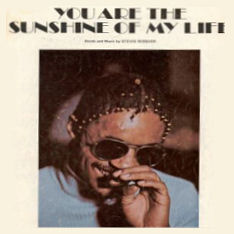| "You Are the Sunshine of My Life" | ||||
|---|---|---|---|---|
 | ||||
| Single by Stevie Wonder | ||||
| from the album Talking Book | ||||
| B-side | "Tuesday Heartbreak" | |||
| Released | 10 March 1973 [1] | |||
| Recorded | 1972 | |||
| Genre | ||||
| Length | 2:58 | |||
| Label | Tamla | |||
| Songwriter | Stevie Wonder | |||
| Producer | Stevie Wonder | |||
| Stevie Wonder singles chronology | ||||
| ||||
| Official audio | ||||
| "You Are The Sunshine Of My Life" on YouTube | ||||
"You Are the Sunshine of My Life" is a 1973 single released by Stevie Wonder. The song became Wonder's third number-one single on the Billboard Hot 100 chart and his first number-one on the Easy Listening chart. [4] It won Wonder a Grammy Award for Best Male Pop Vocal Performance, and was nominated for both Record of the Year and Song of the Year. [5] This song was the second single (following "Superstition") released from the 1972 album entitled Talking Book , which stayed at number one on the R&B albums chart for three weeks. [5]
Contents
- Background
- Reception
- Personnel
- Chart performance
- Weekly charts
- Year-end charts
- Certifications
- See also
- References
- External links
Rolling Stone ranks the song at number 183 on their list of the "500 Greatest Songs of All Time". [6] Billboard called it "a soft, haunting ballad with outstanding electric piano runs and outstanding production work." [7]
In 2002, the song was inducted into the Grammy Hall of Fame. [8]